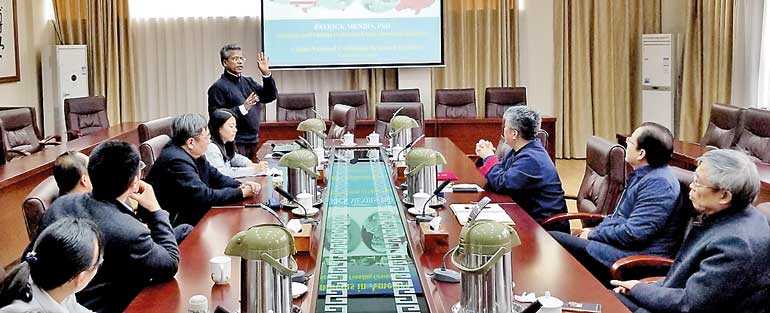Monday Feb 23, 2026
Monday Feb 23, 2026
Thursday, 27 December 2018 01:19 - - {{hitsCtrl.values.hits}}


By Zheng Huizi
QUFU, China: The National Confucius Research Institute of China recently honoured Professor Patrick Mendis with the International Confucius Award. The Sri Lankan-born American diplomat is currently a distinguished visiting professor of Sino-American relations at the renowned Yenching Academy of Peking University in Beijing.
A visiting research fellow of the Confucius Institute in Qufu for almost five years, Professor Mendis involves in promoting Chinese culture and Confucian values in addition to better understanding between China and the United States. A former Rajawali senior fellow of the Harvard Kennedy School’s Ash Center for Democratic Governance and a research associate of the Fairbank Center for Chinese Studies at Harvard University, he is presently serving as an American commissioner to UNESCO, an UN agency in Paris.
Professor Yang Chaoming, the president of the Confucius Institute, welcomed Professor Mendis and other distinguished researchers at the Qufu symposium. The invited experts included the deputy party secretary and vice president of the Institute Dr. Mi Huaiyong and other nationally-prominent Confucius scholars like Dr. Wang Junlin and Dr. Liu Guangsheng.
Introducing the honoured guest, President Yang said that the Harvard-trained scholar is “an American educator, diplomat, author, and government official.” Professor Yang then added, “Dr. Mendis is a friend of China.” He has been committed to “promoting and disseminating China’s excellent traditional culture, especially Confucianism in the world,” said the Institute president.
Moreover, Professor Mendis has been a prolific writer, actively discussing the positive impact of Chinese traditional culture, international trade, and the exchange of ideas. He has donated his important works, including the books on “Trade for Peace,” “Commercial Providence,” “Peaceful War,” and many other works involving Sino-American relations and Confucian ethics to the collection centre of the Confucius institute.
Prior to receiving the certificate of honour, the Yenching Academy professor made a penetrating presentation titled “Confucius in America: Inspiring the Founding Generation.” He then conducted in-depth discussions with the invited scholars on the influence of Confucian thoughts in the founding of the United States and the underlying cultural comparisons between China and America.
With numerous examples, he highlighted that Confucianism had an enduring impact on the thoughts of the Founding Fathers, especially Benjamin Franklin, Thomas Paine, and Charles Thomson. Even George Washington and Thomas Jefferson benefited from China trade and Confucian culture, said Professor Mendis. Today, the eastside pediment of the United States Supreme Court building’s three marble figures represents the ancient lawgivers of Moses, Confucius, and Solon.
Confucian thoughts were widely respected in the United States as they played an important role in world peace and development. There are many similarities between the two countries in their beliefs in “heaven” in China or “providence” in America, emphasised Professor Mendis, as he pointed out the application of “square” and “circle” in architectural designing and city planning of Beijing and Washington, D.C., which derived from the legendary Fuxi and Nuwa, the Chinese Adam and Eve.
As the two great powers with cultural consensus, China and the United States can achieve win-win cooperation through effective communication and dialogue by jointly promoting world harmony and building a community of shared future for everyone, concluded Professor Mendis, who also received the Benjamin Franklin Award from the US Department of State during the George W. Bush administration.
Presenting the Confucius Award, President Yang expressed China’s appreciation and respect for the contributions made by Professor Mendis in promoting Confucianism and better understanding between China and the United States.
(Original translation from Chinese to English is by Zheng Huizi. Photos are courtesy of the Confucius Research Institute of China).